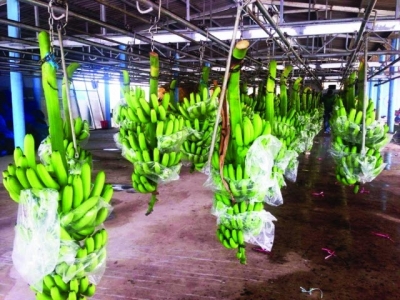Vietnam paves pathway to Middle East market

Minister of Agriculture and Rural Development Nguyen Xuan Cuong believes there’s room for Vietnamese agricultural products, especially rice and fruit, to penetrate the Middle East market.
Banana exports to the Middle East face numerous difficulties in payment
Iranian market potential
The Middle East is a large market with more than 400 million consumers from 16 countries. Vietnam can export rice, tea, coffee, pepper, natural rubber, cashew nuts, fruit and seafood, while its imports from this region include fertilizers, chemicals, ores, minerals and fabrics. Last year, trade between Vietnam and the Middle East reached more than US$10 trillion, including over US$8 trillion worth of Vietnamese exports, with rice, fruit and garments making up a large portion.
At a recent meeting between the Ministry of Agriculture and Rural Development and the Iranian Embassy in Hanoi, Minister Nguyen Xuan Cuong affirmed the Middle East is a large market that offers a gateway to the European market. Goods that are traded between Vietnam and Iran, in particular, and the Middle East, in general, complement each other. Therefore, the potential of bilateral trade is great.
Representatives of businesses attending the meeting shared the opinion that trade in agricultural products between Vietnam and the Middle East remains incommensurate with its potential, especially for rice and fruit.
Dinh Dai Nghia, Deputy Director of the Foreign Trade Department of the Vietnam Northern Food Corporation (Vinafood 1), said, “There’s room for Vietnamese businesses to promote exports to Middle East countries. Iran, for example, is a large rice importer with annual demand for 1.2-1.3 million tonnes. Each year, Iran imports one million tonnes of rice of a specific variety from India, and 200,000-300,000 tonnes of white rice from other sources. Vietnamese businesses therefore can export white rice to Iran.”
Payment, logistics problems
Experts and businesses say trade between Vietnam and the Middle East is hampered by various elements, including payment-related problems. Businesses pay mostly through intermediary banks in Dubai, China, Singapore or some European countries, incurring higher costs and a measure of risk for the exporters.
Logistics problems also hinder Vietnam’s trade with the Middle East. In the opinion of Le Quang Nhuan, General Director of the Louis Rice Import, Export Co., Ltd, businesses that export to the Middle East should join hands in hiring a transportation company at an acceptable cost, as transportation costs greatly affect prices of traded goods.
Iranian Ambassador to Vietnam Saleh Adibi said Iran has established linkages with many banks worldwide, through which Vietnamese businesses can pay. He expressed his hope that Vietnam and Iran would promote negotiations to sign a preferential trade agreement in the near future.
Minister of Agriculture and Rural Development Nguyen Xuan Cuong: The Ministry of Industry and Trade and the Ministry of Agriculture and Rural Development will send a business delegation to Iran to conduct a market survey and trade promotion later this year. The Agro Processing and Market Development Authority and the Vietnam Chamber of Commerce and Industry will continue supporting business efforts to promote exports to the Middle East.
Có thể bạn quan tâm
Phần mềm

Phối trộn thức ăn chăn nuôi

Pha dung dịch thủy canh

Định mức cho tôm ăn

Phối trộn phân bón NPK

Xác định tỷ lệ tôm sống

Chuyển đổi đơn vị phân bón

Xác định công suất sục khí

Chuyển đổi đơn vị tôm

Tính diện tích nhà kính

Tính thể tích ao hồ



 Vietnam sees opportunity in fruit, vegetable, flower exports
Vietnam sees opportunity in fruit, vegetable, flower exports  Rice farmers rue missing out on price rise
Rice farmers rue missing out on price rise